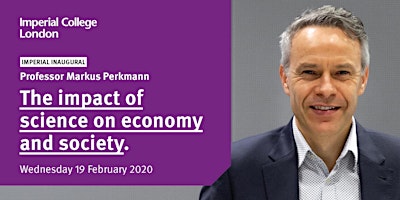You must login before you can post a comment.
Wednesday 19 February 17:30 - 18:30
Lecture theatre 200, City and Guilds Building
Imperial College London
South Kensington Campus
London
SW7 2AZ
Registration
- 🍻
The impact of science on economy and society
Science & Technology
The lecture is free to attend and open to all, but registration is required in advance.
A drinks reception will follow in the concourse of City and Guilds building.
Abstract
Science is an established part of modern society, and much of it is conducted at universities. While science operates in relative autonomy from other parts of society, it has always faced the demand to be useful and impactful.
Recently, these demands have become more forceful. Policy makers have encouraged universities to commercialize their inventions, and to put their research more directly in the service of innovation. This has raised fears that science might become less creative, too responsive to commercial needs and compromised in its autonomy.
In his inaugural lecture, Professor Markus Perkmann will explore whether and when such tensions between autonomy and impact actually exist. He will further highlight the ways in which the integrity and autonomy of science can be reconciled with the legitimate demand for impact. Drawing on research that others and Markus have conducted on this topic, he will shed light on the following questions:
- What are the mechanisms by which science achieves impact on economy and society, and how important is academic science as an engine of innovation?
- Does science get compromised by commercial interests?
- How do universities organize themselves in order to maintain the autonomy of science whilst responding to the quest for impact?
- What are the new ways in which we can imagine scientific impact, beyond the narrow concept of commercialization?
This lecture should be relevant to all those who are interested in the role that science and universities play in today’s economies and societies, and the ways in which science can be made impactful in its widest sense.
Biography
Markus is professor of innovation and entrepreneurship at the Imperial College Business School. He is the academic director of the School’s MBA programme, and of the Imperial Enterprise Lab.
In his research, Markus studies the organization and the business of science. He has led a research programme exploring the interface between the world of academic science and industry, and special hybrid organizations that can bridge both worlds. He has also investigated the opportunities and intricacies of academic entrepreneurship which is when academic scientists create companies to commercialize their inventions. He is currently broadening this research to study employee entrepreneurship within corporations, and corporate accelerators. Finally, he is also working on the science of evaluation, i.e. how individuals, firms and products are evaluated by others and how this process is affected by biases and pre-conceptions.
Markus is the Co-editor in Chief of the journal Innovation: Organization & Management. He was previously head of innovation at start-up firm Greychip. He has a PhD in Sociology from Lancaster University, and joined Imperial in 2008.
Please note that Imperial College London processes your personal data in line with the Advancement Privacy Notice. If you have any questions or concerns about this, please contact [email protected]





